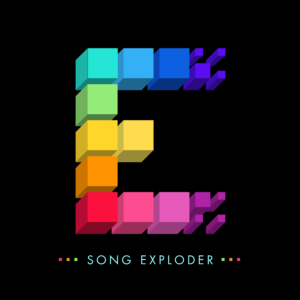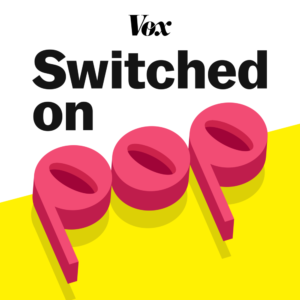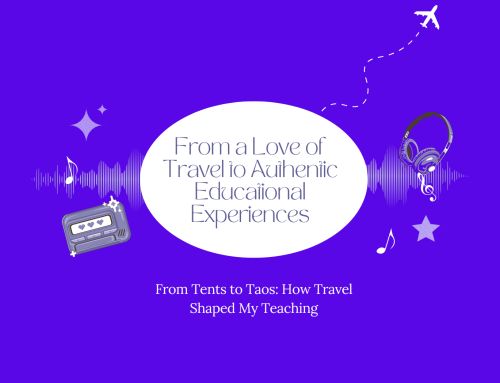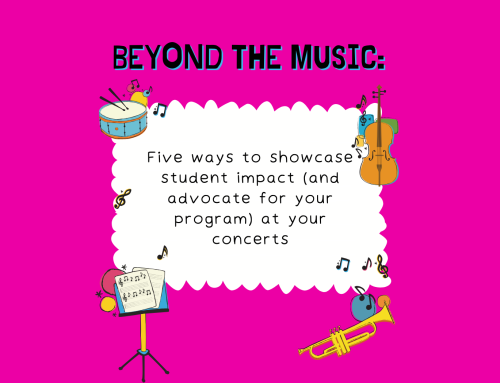Are you a podcast listener? If so, you have probably listened to a podcast or two about music education. There are so many great examples out there. However, this post is not about music education podcasts (we’ll save that for another time). This post is about using podcasts on music to create lesson plans that engage students in active listening.
I’ve been teaching at the secondary and collegiate levels for years and have recently started incorporating podcasts into my curriculum. Now, as many of my students are attending school virtually, I am using podcasts more than ever. Why?
- Students can listen wherever they’d like and take a screen break.
- Students can learn production skills by listening to well-produced podcasts.
- Podcasting is a way to connect students to the music-making process through an aural medium, mirroring how music is created in the first place.
So, which podcasts am I using in my classroom? Here is a roundup of three podcasts I’m using with my students and some of my favorite episodes.
Table of Contents
Song Exploder
 Song Exploder is, hands-down, my favorite podcast. The production value is incredible, the storytelling is compelling, and you learn so much in every episode. What is song exploder? Via their website, “Song Exploder is a podcast where musicians take apart their songs, and piece by piece, tell the story of how they were made.” Hrishikesh Hriway hosts it, and guests have included Fleetwood Mac, U2, Metallica, Solange, Lorde, Yo-Yo Ma, Carly Rae Jepsen, and more. What’s incredible about this podcast is that creators share original tracks, voice memo demos, and all sorts of never-released sounds that came together to create some of the songs we know and love. I also love that there is something for everyone. This podcast is cross-genre, and there are tons of episodes to choose from.
Song Exploder is, hands-down, my favorite podcast. The production value is incredible, the storytelling is compelling, and you learn so much in every episode. What is song exploder? Via their website, “Song Exploder is a podcast where musicians take apart their songs, and piece by piece, tell the story of how they were made.” Hrishikesh Hriway hosts it, and guests have included Fleetwood Mac, U2, Metallica, Solange, Lorde, Yo-Yo Ma, Carly Rae Jepsen, and more. What’s incredible about this podcast is that creators share original tracks, voice memo demos, and all sorts of never-released sounds that came together to create some of the songs we know and love. I also love that there is something for everyone. This podcast is cross-genre, and there are tons of episodes to choose from.
How do I use this in my classroom? In each class I teach, when I talk about the process of music creation or musical creativity, we complete a listening log to an episode of Song Exploder. I allow students to choose an episode to listen to and then reflect on the artist’s process, asking questions like: What was surprising about this musician’s process? What term(s) were new or unfamiliar in this episode? If you were hoping to recreate the song from this episode, what would be challenging?
Favorite episodes: The Black Pumas, Semisonic, Yo-Yo Ma, The Decemberists, Hozier
*Note: some of the episodes of Song Exploder do contain mature language. If you are worried about the content, it might be helpful to pre-screen a few episodes and give students a choice within selected parameters.
Twenty Thousand Hertz
 Get ready to have your mind blown. This podcast is all about sound — electronic and acoustic sounds and how they are created. It touches on history, psychology, philosophy, and more! Each episode involves a deep dive into a specific topic of sounds with special guests throughout each episode.
Get ready to have your mind blown. This podcast is all about sound — electronic and acoustic sounds and how they are created. It touches on history, psychology, philosophy, and more! Each episode involves a deep dive into a specific topic of sounds with special guests throughout each episode.
How do I use this in the classroom? Students listen to a specific episode, and we create a project based on the topic addressed in the episode. For example, in the “Ta-dum! It’s Netflix” episode, the hosts look into the world of audio logos and speak to members of the Netflix team about their quest for the perfect sound to represent their brand. (You can probably hear the Netflix sound as you read this right now!). I then send students on an audio logo scavenger hunt, finding and sharing iconic audio logos from various brands. Then, students use a DAW to create their own audio logo that relates to their identity.
You could use recent episodes to talk about sampling, engineering, virtual choirs, and more! Be sure to pre-listen to episodes as this podcast involves long-form storytelling, and you may want to jump around or break episodes down into chunks.
Favorite Episodes: Virtual Choir, The [compressed] History of Mastering, Boots ‘N Cats, Ta-Dum! It’s Netflix
Switched On Pop
 This is a podcast on the “making and meaning of popular music.” If you’ve been following us for a while, you already know that pop music is my jam. I’ve been performing in indie-pop bands for over a decade and can’t get enough pop music in and out of the classroom. This podcast is hosted by a musicologist (Nate Sloan) and songwriter (Charlie Harding) and has that perfect mix of music-nerd facts and practical applications. There are stories, deep dives into music releases, and history and culture, all wrapped in an engaging format.
This is a podcast on the “making and meaning of popular music.” If you’ve been following us for a while, you already know that pop music is my jam. I’ve been performing in indie-pop bands for over a decade and can’t get enough pop music in and out of the classroom. This podcast is hosted by a musicologist (Nate Sloan) and songwriter (Charlie Harding) and has that perfect mix of music-nerd facts and practical applications. There are stories, deep dives into music releases, and history and culture, all wrapped in an engaging format.
How do I use this in the classroom? This is an excellent format for engaging students in a more profound way with music they already have known and loved. For example, I can use the episode, “What Happens When Justin Bieber Samples Your Music” to talk about the importance of attribution and how the music industry works when it comes to sampling and remixing previously created work. I can also encourage students to find other examples of relatively unknown content creators writing music for hit singles.
Have students listen to the four-part mini-series, “The 5th” to find out the history and drama behind Beethoven’s Symphony #5. You could use this to discuss how individual artists have influenced concert culture in their genre and have students dig deeper into modern artists who have challenged the way people consume music in a live setting. As with all of the podcasts in this post, I’d recommend listening first to make sure it is appropriate for your students and consider ways to break up each episode.
Favorite Episodes: The 5th, What Happens When Justin Bieber Samples Your Music, Were We Wrong about Kayne West? Post Malone has us Running in “Circles.”
Check out our SOP partnership to use lessons in your classroom!
What do you think?
While this is by no means an exhaustive list of podcasts that are fantastic for music education (we didn’t even get into Broken Record or all of the podcasts on composing), they are a great place to start if you’re looking to incorporate podcast listening into your music curriculum.
And what about you? Do you use podcasts with your students? Share your recommendations in the comments below!




Leave A Comment